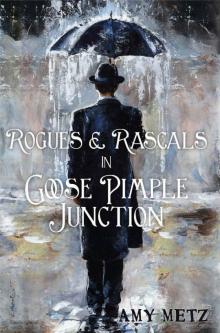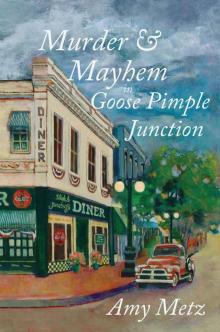Rogues & Rascals in Goose Pimple Junction (Goose Pimple Junction Mysteries Book 4) Read online
Page 2
Caledonia clamped a hand over her mouth to stifle what she wanted to say. She could hear her mother’s voice admonishing her to “be kind, considerate and, above all, always a lady.”
So instead of what she was thinking, she said, “Why, no, precious, this one will do just fine.” She opened the dressing room door, and with a smile, deposited the size eight dress into Miss Piggy . . . Um . . . Penny’s hands. “I won’t be needing that one,” she scrunched her nose as punctuation, “sugar.”
Because she didn’t want to give Bad Penny any more business than she absolutely had to, and she certainly didn’t want the woman knowing all her business, she walked around the corner to The Panty Waist, a lingerie store, where she bought a lacy pair of red panties and matching strapless bra. She’d have to pull the big guns out, so to speak, she thought with another giggle.
On her way home, she called her husband, Philetus Swift Culpepper IV. “Hey, darlin’. I have a surprise for you,” she cooed into the cell phone. “You will be home at the normal time tonight, won’t you?” She listened and then said, “Great,” making it a three-syllable word. “I’ll see you soon, sugar.”
She hung up as she walked past Slick & Junebug’s Diner, looking in the window at the busy restaurant. Her smile faltered when she spotted her husband with . . . the little Dutch Boy? No, it was that insipid shyster woman lawyer who reminded her of the little Dutch Boy. Caledonia remembered her mother’s advice to never show anger in public, so she kept walking, smile firmly in place, confident that her husband would never be romantically involved with the likes of that woman. But why hadn’t he mentioned who he was with?
Caledonia was ready and waiting when Philetus came through the front door four hours later. She’d spent all afternoon getting dressed, starting with a long bath—”showers are for men,” her mother used to say—followed by lotion, powder, and perfume. She rolled her hair in big fat curlers to give it volume, and she applied just the right amount of makeup. And finally, the dress. She was twirling in front of her full-length mirror when her seventeen-year-old son Pickle came into the room.
“Gosh, Mom. You look real pretty.”
“Thank you, darlin’.” She kissed and patted his cheek. “Now, hon, I ordered a pizza for y’all, and you have the movie. You make sure your brother takes a bath and gets in bed at nine, okay?”
“Yes, ma’am. We already went over all this, Mama.”
“Well, I know, darlin’, but it’s my job to worry over my babies. You wouldn’t deprive me of my God-given right, would you?”
“Oh, Mama,” Pickle groaned. She kissed him again and rubbed the lipstick off his cheek with her thumb.
“You really are awful pretty tonight, Mama.”
After her careful preparations that took all afternoon and her son’s genuine compliments, she was devastated when her husband walked in and didn’t seem to notice her efforts at all.
She made a drink, handed it to him, and then stood back to give him a full view. Trying outwardly to act casual, she was inwardly crushed.
Finally, his drink finished, he asked, “So what’s for supper?”
She pasted on her smile again and said, “I’m taking you out tonight, sugar britches.”
He frowned. “What about the kids?”
“They’re staying home and having a pizza.”
“What’s the occasion? It’s not your birthday or anything is it?”
“No, silly. I thought it would be nice for just the two of us to go out is all.”
“Humph. What would be nice is for us to have a Visa bill under three thousand dollars this month,” he grumped.
She took a deep breath, smiled, and called out, “Pickle, Peanut, we’re going now. Y’all behave.”
The kids came running to say goodbye, and nine-year-old Peanut said, “Is Pickle really the boss of me while you’re gone?”
“Yes he is, my little peanut. And you best mind him, or I’ll be on you like ugly on an ape.” Caledonia used a combination of her serious voice and sweet smile that told her children she was serious, but she loved them dearly.
Dinner at The Silly Goose did not meet Caledonia’s expectations but not because of the restaurant or the food. Every man in the room—except for Phil—was aware of Caledonia Culpepper. He was moody and sullen, using his mouth to down three gin and tonics instead of talking to his wife. And since text messages dinged throughout their dinner, his attention was more on his cell phone than his wife. She tried to ignore it all and made several attempts at conversation. First, she tried discussing the upcoming cotillion at the country club.
“Caledonia, it’s not a damn cotillion. It’s more like a kegger, for gosh sakes.”
“Oh foo, every party’s a cotillion to me. You know that.”
She talked about politics, but Philetus had no opinions on the state of the economy or international affairs, and he did not contribute to the conversation.
She told him about the question their youngest son had asked that afternoon, “Weren’t Cain and Abel’s wives their sisters?” But Phil had no idea how to answer that, and he was too tired, he said, to think about it now.
Toward the end of the evening, he did finally take notice of his wife’s appearance. When they’d finished eating, she excused herself to the ladies’ room to powder her nose (which really meant apply her lipstick because her mama had taught her to never be seen in public without her lipstick perfectly applied). When she sashayed back to the table, all male eyes in the restaurant were on her sashay. She noticed her husband look up from his phone to her, and she saw his expression go from a smile to puzzled. He kind of tilted his head, squinting his left eye as he studied her.
She sat. “What?” She had visions of toilet paper sticking out of her dress or something equally as horrible.
“Did you go to the barber shop today?” he asked.
She stared at him for a long moment and then stood and quietly said, “It’s been lovely. But let’s go home now, Philetus.”
In their bedroom that night, she took her time getting undressed, waiting for him to notice her new lacy lingerie.
“Is that new?” he finally asked, just when she was ready to give in and put on her cotton pj’s.
“Yes,” she said hopefully, turning quickly to him, an instant smile on her face. But it was frozen in place after his next comment.
“How much did that set me back?”
Caledonia couldn’t figure out where she’d gone wrong. She was a good cook and provided carefully thought-out meals for her family. She took care of the kids and the house without the aid of a maid or a nanny. She made life at home easy for Philetus so all he had to do was go to work and come home. She thought of interesting things for them to do, places to go, and things to see. She never blew her nose in public or said a cuss word worse than “goshdarnit” or “dagnabbit.” She didn’t smoke, drink, or chew, and she didn’t associate with those who do . . . well, she maybe sipped—a lot—but she was never drunk in public.
And she never, ever, ever wore white shoes before Easter or after Labor Day.
She thought her mother would have been proud of the Southern woman she had become. Why wasn’t her husband proud?
She lay in bed that night, wondering what to do. She’d used her feminine wiles to her utmost power but to no avail. It was as if she were invisible to him.
Her mind went to the night of a Christmas party they’d attended. Beforehand, she’d coiffed, buffed, puffed, and readied herself until she glowed. Philetus didn’t take notice. But she did overhear him noticing a coworker.
It had hurt her to the core when she overheard him tell the woman, “You look great tonight, by the way.” It wasn’t just the words he’d said, but the way he said them that hurt. He was tender, sincere, genuine, and flirty. He’d never said anything like that, or in that way, to her—ever.
She’d cried herself to sleep that night, just as she did tonight.
Mama always said . . . If it’s got tires or testicles, yo
u’re going to have trouble with it.
A little after 4:30 p.m., Caledonia walked down the hall of the primary wing of Robert E. Lee Elementary School finishing up her volunteer duties for the day. She ducked into room 120, but it was empty, so she walked to the teacher’s desk to leave a flyer. Caledonia abruptly stopped when she heard the sound of breaking glass. After looking all around—actually turning herself in a circle—she went to the wall of windows at the back of the classroom. She saw two teenagers out in the yard, and they were up to no good. One of them was swinging a baseball bat and systematically breaking all the windows of the classroom next door, while the other kid howled with laughter. Her first thought was to dash out the door leading from the classroom to the schoolyard and confront the vandals. Then she remembered it was Martha Maye’s room next door and instead, dashed through the small bathroom that separated the classrooms, hurrying into room 118.
Thankfully, that room was also empty. Just as she let out a sigh of relief that Martha Maye wasn’t harmed, a blow hit another window and sent glass flying into the classroom. Her arms flew up to protect her face and head. Then she crouched behind the big wooden desk and peeked around it.
It was early June and school had just let out for the summer. Teachers were still in the building cleaning their classrooms and finalizing the school year that had just passed. She figured at this late hour, most had gone home for the day if not for the entire summer.
Another crash sent glass raining down around her. She wrapped her arms around her legs and curled into a tight ball until the glass stopped falling. Then she pulled out her cell phone and dialed 911.
“Nine-one-one, what is your emergency?”
“Aunt Bea, this is Caledonia Culpepper. I’m over to the school, and”—another window exploded followed by more glass. She stopped talking to cover her head again.
“What in the world was that?” Bernadette, the police dispatcher, asked.
Caledonia peeked out again and this time caught a glimpse of the boy underneath the ball cap. “It’s Jimmy Dean Howe, and he’s behind Lee Elementary breaking the school windows with a baseball bat.”
“Good Lord, what’s he doing a fool thing like that for?”
“I don’t know, but he’s really going to town. You best get somebody over here pdq.”
“Hold on, Caledonia.” The phone went mute for a moment, and then Bernadette returned. “Hank’s on his way, hon.”
Caledonia watched as the boys took off running across the schoolyard. “Well, he better hurry or he’s gonna miss the little miscreants. They’re running away now.”
“They can run, but they can’t hide. We’ll need you to ID them, so you sit tight.”
“Of course.”
Caledonia was putting on Pink Passion, her favorite pink lipstick, when the doorbell rang. She thought about not answering it because she didn’t want to be late, but the bell sounded again. This time, it was accompanied by a powerful knock, and she thought whoever was there sounded persistent and insistent. She went to the door to find Louis P. Howe on her doorstep.
“Louis, I –”
“Good morning, Mrs. Culpepper, uh, Caledonia. I do hope I’m not interrupting. May I have the pleasure of your company for just a few minutes?” An ingratiating smile spread across his face.
“Well, I suppose, although I was getting ready to meet someone.”
“It’ll just take a minute.” He pushed past her into the house.
“Well, by all means, come on in.” In her head, the comment was made sarcastically, but she tried to be gracious in her outward demeanor.
He led her—instead of the other way around—to the sitting room, where they sat opposite one another. He leaned back on the sofa, splayed his arms on the top of the couch cushions, and propped his ankle on his knee.
“Can I get you some coffee? Perhaps a muffin?” She tried her best to put on a pleasant expression.
“Yes, you may. Coffee, please.”
Caledonia returned in a flash with a tray containing two glasses, an iced tea pitcher, and a dish of sliced lemon. She remembered he had said he wanted coffee, but she didn’t like the man, so she deliberately brought tea.
To his credit, he said nothing. Only his face gave away his displeasure. He balanced the glass on his knee and began to talk. “I’ll not take much of your time, although I do appreciate your hospitality. No, I’m here for one simple reason: I’d like to contribute to your son’s, uh . . . Pickle’s . . . college education.” He flashed an insincere smile again.
Confusion crossed her face. “What on earth for?” She picked up the plate of muffins and offered it to him. “Muffin?”
“No, thank you.”
Peanut stuck his head in just then and said, “Can I have one, Mama?”
She handed him the plate. “Go see if your brother wants one too. Then get your shoes. We’re going out in just a bit.” She turned to Louis.
“The details aren’t important. The point is, I’m here to make you an offer you can’t refuse.”
“Whatever for?” Her hand flew to the pearls around her neck.
“Well, frankly, for your silence. You see, the police really have no evidence against my son. All they have is your word.”
“So you want me to lie?”
“Yes. You can just say you were mistaken. And we’ll keep this little transaction between us. You understand?” His smile remained in place as he put the glass back on the tray and pulled out his checkbook.
“That won’t be necessary, Louis.” She took a sip of tea. “There will be no transaction.”
His smile turned to a scowl when she finished her thought. “Excuse me?” His voice was taut.
She spoke slowly and distinctly. “There. Will. Be. No. Transaction.” Now it was her turn to flash a false smile.
He sat forward. “I haven’t even made you an offer yet.” Whether intended or not, his tone was condescending.
“No need. I won’t lie. That is what you want me to do, right?”
“I wouldn’t put it in such crude terms—”
“Oh, Louis, if it walks like a duck and talks like a duck, it’s a duck. What you are suggesting is out of the realm of possibility. I will not lie to the law or anyone else. I suspect that’s a lesson Jimmy Dean needs to learn as well.” She stood and walked to the doorway giving him a look that suggested he should follow her. “Now, if you’ll excuse me, I really do have to meet someone.”
Louis’s face turned bright red with anger as he returned his checkbook to his pocket and grabbed his briefcase. He sprang to his feet and leveled his gaze on her. “You’re making a mistake.”
“No, sir. Jimmy Dean made a mistake when he broke those windows. And you’re making a mistake by trying to take care of it for your boy. I’m not a judge or jury or an expert on parenting, but I don’t think he should get off that easily.”
“I’ll thank you to leave the parenting of my son to my wife and me.” He shifted the briefcase from hand to hand. “My influence carries far and wide in this town. You just remember that.”
“I don’t like your tone, Louis.”
“I didn’t mean for you to.” He spun on his foot and stormed out the door, slamming it so hard the windows rattled.
“Well I never—”
Jackson Wright sat in his home office with his cell phone to his ear, one foot propped on the other knee. “I feel for you, Oren, I really do. When your wife’s interested in work more than in her husband, that can make for a lonely life. My only advice would be to talk to her. Tell her how you feel. I’d bet she’s unaware of your unhappiness.”
“I’ve talked until I’m blue in the face,” the voice said over the phone.
“Well, talk some more. And dote on her. Women want to be appreciated. When they feel appreciated, they’ll do more. Give that a try. Okay? Talk later.”
He punched off and saw his wife leaning in the doorway with a sour expression on her face.
“Uh-oh. What has made that beautifu
l face scowl like an ogre? What did Ezzie do now?”
“How do you know it was Ezzie? Maybe you did something.”
“Nope. We’ve only been married a few months, but I know that look of yours. That’s an Ezzie-did-it-again look.”
“Well, you’re right. She did. I’m at my wit’s end with that dog.”
Jack went to Tess and wrapped her in his arms. He hugged her tight, swaying slightly. He kissed her and said, “Love me, love my dog?”
She took his hand and led him to the kitchen where the Basset hound sat under the table, her pleading eyes moving from Tess to Jack. Any question of her guilt was now moot.
Jack bent at the waist to peer at her under the table. “Ezmerelda, what did you do?”
Her ears dropped, and her eyes drooped.
Jack stood and looked at his wife. “What did she do?”
Tess picked up a bread wrapper off the counter and held it out to him. “I found this on the floor. If you’ll notice, there is a tear down the center, and the bread is gone. I just bought this loaf this morning. I set it on the table while I was unpacking the groceries. I turned my back no more than two minutes, and she sucked the bread right out of the wrapper. That dog is unbelievable.”
Jack couldn’t help it. A huge smile crept onto his face. “That is freaking awesome! I own the smartest dog, and I’m married to the most beautiful woman in the world.”
Tess stared at Ezzie for a moment and then at Jack. She began to laugh. “Don’t encourage her. And don’t use flattery to get your dog out of trouble.”
“It’s not flattery. It’s the truth.”
“Well, whatever it is, now you’ll be taking me to the diner for lunch.”
Jack beamed at Tess. “You gotta admit that is one special dog.”
Ezzie’s ears perked up, hopeful she was out of trouble.
“I’ll admit she’s gifted in the art of eating. How she eats Pop-Tarts, bread, and cookies without eating the wrappers is beyond me. Maybe she has opposable thumbs.”

 Rogues & Rascals in Goose Pimple Junction (Goose Pimple Junction Mysteries Book 4)
Rogues & Rascals in Goose Pimple Junction (Goose Pimple Junction Mysteries Book 4) Short & Tall Tales in Goose Pimple Junction
Short & Tall Tales in Goose Pimple Junction Murder & Mayhem in Goose Pimple Junction
Murder & Mayhem in Goose Pimple Junction 2 Heroes & Hooligans in Goose Pimple Junction
2 Heroes & Hooligans in Goose Pimple Junction